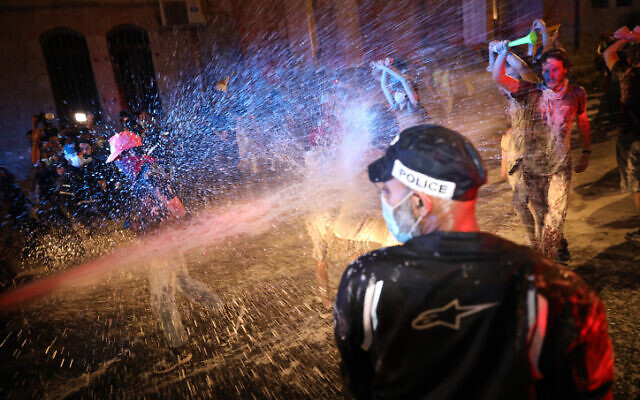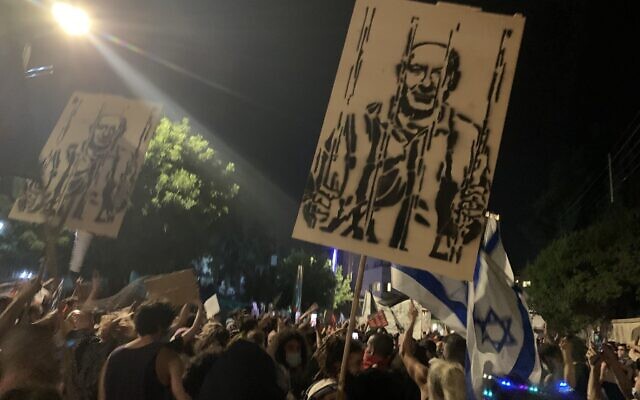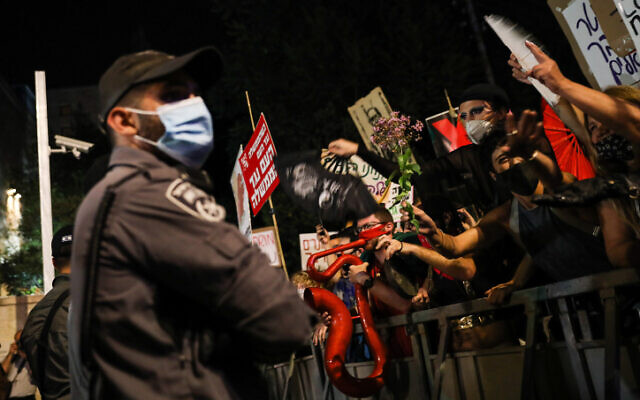Protesters block roads during hours of rallies in 2 cities; some clash with police in capital; 13 Tel Aviv demonstrators arrested after officer pepper-sprayed, torch thrown at cops

Thousands of people took part Saturday evening in concurrent anti-government protests in Tel Aviv and Jerusalem, with the former focusing on the government’s economic policies amid the resurgent coronavirus pandemic, and the latter calling on Prime Minister Benjamin Netanyahu to resign over his corruption trial.
In both cities, protests began in areas designated by police but later spilled over into the streets, with demonstrators marching through the cities and sometimes clashing with cops. Fifteen protesters were arrested in Jerusalem, and 13 in Tel Aviv.
In the capital, thousands protested near the prime minister’s official residence. Large crowds of those who had gathered then marched though a series of roadblocks meant to contain them and blocked roads as they paraded for hours through the streets around the area, largely peacefully, waving anti-Netanyahu banners to the beats of drums and loud vuvuzelas.
Little to no social distancing was being observed between participants, though most were wearing masks. The crowds comprised a large majority of young people — from late teens through 20s and 30s.
Police later clashed with some of the protesters and used water cannons in an attempt to disperse the crowds.
המשטרה מנסה לפנות באמצעות רכב התזה את המפגינים שחוסמים את רחוב בצלאל בירושלים וקוראים “מדינת משטרה” @moyshis pic.twitter.com/rjoss6r6pA
— כאן חדשות (@kann_news) July 18, 2020
Officers were filmed violently removing anti-Netanyahu protesters blocking the road near Jerusalem’s Sacher Park. A number of the demonstrators were heard shouting “Nazis” at the officers.
Saturday’s protest in Jerusalem was the fourth such rally in the past week at the junction of Gaza Street and Balfour Street.
גן סאקר: האלימות החלה. המפגינים קראו לעבר המכתזיות “נאצים” pic.twitter.com/9lZ2Dnyqso
— שחר גליק (@glick_sh) July 18, 2020
Earlier, protesters demanding the premier’s resignation also rallied on dozens of bridges over roads throughout the country.
Thousands also demonstrated at Tel Aviv’s Charles Clore Park, while generally maintaining social distancing.
Late on Saturday night, police said they were arresting protesters in Tel Aviv who hurled objects and pepper-sprayed an officer. A torch was also thrown at police, apparently causing no injuries.
ומתחילים: מעצרים בכיכר הבימה. במשטרה אומרים שהמפגינים התיזו גז פלפל על שוטר@netzer_ben pic.twitter.com/fZcD5Dyco3
— ליה ספילקין | Lia Spilkin (@LiaSpilkin) July 18, 2020
Thirteen protesters had been arrested in Tel Aviv, according to Hebrew reports.
Addressing the Tel Aviv rally, self-employed business owner Nir Hirschman said, “Mr. Prime Minister, the second wave of the coronavirus did not surprise anyone. You knew it was coming. But you wasted your time on nonsense.
“While you went to get tax exemptions, you should have been worrying about establishing an epidemiological contact-tracing system. Instead of planning a fight against the justice system, you should have been planning to fight against unemployment.”
Actress and comedian Orna Banai said it was time for Netanyahu to “go home.” Said Banai: “I don’t remember there ever being a government so cruel, disconnected and bereft of values such as justice, honesty and compassion.” She claimed Netanyahu was busy with “dismantling the state” rather than dealing with the economic ravages of the coronavirus.

Social worker Suheir Deksah said: “If the government listened and cared, I’d tell them a million people unemployed is a disaster. I’d tell them that people with an empty fridge is not ‘bullshit’… They’ve thrown an entire public into a struggle for survival, while Netanyahu seeks tax benefits and tycoons make gains.”
Unlike the previous economic protest in Tel Aviv last week, this week’s rally also included members of the “black flag” movement that has warned that Netanyahu is eroding Israeli democracy through his attacks on the justice system and police amid his corruption trial.
The black flag protests are an ongoing movement against Netanyahu, who is standing trial in a series of graft cases. Demonstrations have been held regularly around the country, with protesters waving signs reading “crime minister” and calling for Netanyahu to resign.
Netanyahu faces charges of fraud and breach of trust in three separate cases, as well as bribery in one of them. He has denied wrongdoing and claimed the charges are part of an effort by political opponents, the media, law enforcement and prosecutors to remove him from office.
As the rally came to a close, hundreds also blocked roads near Charles Clore Park as they marched and continued chanting.
מאות חוסמים את הטיילת בתל אביב אחרי מחאת העצמאים, צועקים ״ביבי הביתה״ וקוראים לנהגים להצטרף אליהם. חשבתי שהברדקיסטים עלו הערב לירושלים ושבתל אביב יהיה פסטיבל אבל נראה שיש מספיק זעם לכולם pic.twitter.com/ecbf6IG1Cd
— Bar Peleg (@bar_peleg) July 18, 2020
Ahead of the protest, organizers of the Jerusalem rally said they were gathering due to the “government’s failure to manage the crisis.”
In a statement from junior Jerusalem activists carried by Channel 12, organizers said: “We’ve had enough of remaining silent in the face of the bone-headedness, detachment, corruption and incompetence of this evil government. They have destroyed our livelihood, but we are not prepared to let them destroy our future and our hope as well.”
Responding to those who have accused them of being anarchists, the organizers said, “the real anarchists are sitting in the Knesset and are headed by Prime Minister Benjamin Netanyahu.”
A previous Jerusalem protest, attended by several thousand people on Tuesday, turned violent and dozens were arrested during clashes with police.

In Tel Aviv, self-employed business owners hit by the pandemic’s closures had sought to hold the protest at Rabin Square, where last week at least ten thousand took part in such a rally. But police vetoed a large demonstration at the location due to fears of virus spread. At least one protester who attended the densely-crowded economic protest in the square on Saturday was later diagnosed with the coronavirus.
Police approved the protest at the park on the condition that attendees adhere to virus regulations and attendance stays below 8,000.
Unemployment in Israel is at some 21 percent — or 850,000 people — and is rising, as restrictions imposed amid record daily coronavirus infections further batter the economy. Virus cases are currently rising at some 1,800-1,900 per day. The death toll since the start of the pandemic stood at 400 on Saturday night.
Amid the ongoing rise in national infection rates, the latest coronavirus regulations severely limited public gatherings until further notice (though demonstrations are exempt), ordered the closure of restaurants for in-house seating for the foreseeable future (though that move has been delayed to Tuesday after massive backlash by restaurateurs) and ordered multiple closures on weekends going forward, including of beaches, parks and other recreational activities.
As reported by The Times of Israel
